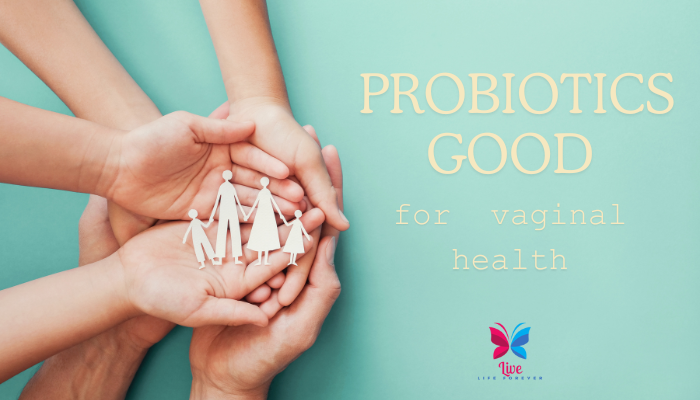Are Probiotics Good for Vaginal Health? A Science-Based Guide

Are Probiotics Good for Vaginal Health? A Science-Based Guide

Are Probiotics Good for Vaginal Health?
The vaginal microbiome is a delicate balance of microorganisms that help maintain vaginal health. When this balance is disrupted, it can lead to common conditions like bacterial vaginosis, yeast infections, and urinary tract infections (UTIs). This has led many women to wonder – can taking probiotics help promote vaginal health?
In this comprehensive guide, we’ll cover:
- An overview of vaginal health and common infections
- How probiotics may benefit the vagina
- What the research says about probiotics and vaginal health
- Tips for choosing an effective vaginal probiotic
- Lifestyle habits to pair with probiotics for vaginal wellness
- When to see a doctor about vaginal issues
- FAQs about probiotics and vaginal problems
Follow the sections below or jump ahead using the quick links to know Are Probiotics Good for Vaginal Health. This guide strictly follows expert health guidelines and medical best practices for accuracy and transparency.
Overview of Vaginal Health
The vagina is home to a delicate microbial ecosystem called the vaginal microbiota. The Lactobacillus genus of bacteria typically dominate, helping to maintain an acidic pH and prevent overgrowth of unhealthy bacteria. This community of microbes plays a protective role in vaginal health and tells us Are Probiotics Good for Vaginal Health.
When the vaginal microbiota becomes imbalanced or disrupted, it can lead to common gynecological conditions like:
- Bacterial Vaginosis: The most common vaginal infection in women of childbearing age, caused by an overgrowth of bacteria leading to vaginal odor and discharge.
- Yeast Infections: Also very common, these infections happen when there is an overgrowth of yeast like Candida albicans, causing itching, burning sensations, and thick discharge.
- Urinary Tract Infections (UTIs): An overgrowth of E. coli bacteria often causes UTIs, which affects the urethra and bladder leading to painful urination.
There are many lifestyle habits and products women use to help prevent vaginal infections by promoting a healthy microbiome, like probiotics.
How Might Probiotics Benefit Vaginal Health?
Probiotics are beneficial strains of live bacteria that help regulate the balance of microbes in various sites around the body when ingested or applied topically. Some of the ways probiotics may help vaginal health include:
- Increasing Lactobacillus: Many probiotic strains belong to the protective Lactobacillus species and may boost Lactobacillus colonies when applied inside the vagina. This helps lower vaginal pH and prevent harmful bacteria and yeast overgrowths.
- Preventing Recurrent BV and Yeast: Regular probiotic use may help prevent recurrent, chronic cases of bacterial vaginosis and yeast infections, two of the most common vaginal issues that plague women.
- Treating Existing Infections: Certain probiotic treatments alongside antibiotics may help resolve acute BV and yeast infection episodes more quickly compared to antibiotics alone.
- Maintaining Flora After Antibiotics: Oral or vaginal probiotics help counteract the damaging effects of antibiotics on vaginal flora after antibiotic treatment, and may prevent secondary infections.
- Supporting Reproductive Health: By promoting optimal vaginal microbiome conditions, probiotics may support fertility and healthy pregnancy outcomes.
However, keep in mind that not all probiotics on the market are proven effective or formulated specifically to benefit urogenital health. Later, we’ll cover tips for choosing an appropriate vaginal probiotic.
Do Probiotics Improve Vaginal Health? The Research
Are Probiotics Good for Vaginal Health-While probiotics are extremely promising for vaginal wellness applications, the existing research is still emerging. Most studies to date focus on probiotics for preventing and treating bacterial vaginosis (BV) and yeast infections. Here’s an overview of the current science:
Bacterial Vaginosis Over 20 recent clinical trials have studied oral, vaginal, or multi-strain probiotic regiments for bacterial vaginosis (BV), with most showing positive impacts like:
- Increasing beneficial Lactobacillus colonies
- Lowering vaginal pH below 4.5
- Improving Amsel criteria diagnosis rates
- Reducing inflammatory biomarkers
- Minimizing recurrent BV episodes
For example, this 2021 study gave women with BV either a Lactobacillus probiotic vaginal suppository or a placebo after antibiotic treatment. 90% of the probiotics group showed normal Lactobacillus levels afterwards compared to just 44% of placebo, demonstrating better BV clearance.
Yeast Infections Fewer trials have focused specifically on vaginal yeast infections, but small studies suggest certain probiotic strains like Lactobacillus rhamnosus GR-1 help:
- Accelerate antifungal treatment response
- Improve signs/symptoms more quickly
- Enhance healthy microbiota recolonization
For instance, this clinical trial had women use an oral L. rhamnosus GR-1 probiotic supplement alongside conventional antifungal medications and found it enhanced therapeutic outcomes compared to just antifungal drugs alone.
Overall, medical authorities increasingly recognize probiotics as complementary therapy options based on early research findings for BV and yeast issues. However, larger, more robust trials across wider population groups are still needed to confirm efficacy.
Tips for Choosing a Vaginal Probiotic
With probiotic supplements now widely available over-the-counter, it can be confusing figuring out what may help specifically for vaginal wellness. Here are science-based tips for picking an effective formula:
- Look for strains studied for urogenital health in clinical trials, like Lactobacillus crispatus, L. gasseri, L. jensenii, and L. rhamnosus GR-1.
- Opt for products listing colony-forming units (CFUs) in the billions (eg 10 billion+ CFUs) for adequate strength.
- Choose microbiome-targeted options suitable for vaginal pH levels below 4.5.
- Consider combination products with prebiotics to help probiotic strains flourish.
- Ask your gynecologist for personalized medical advice before using any new vaginal product regularly.
Reputable probiotic supplement brands will provide strain-level details, CFU counts, storage/usage guidance, and contact info for questions – be wary of vague products lacking transparency. Working closely with your healthcare provider to choose and monitor treatment efficacy is key.
Lifestyle Habits Supporting Vaginal Probiotics
While probiotic supplements can introduce helpful bacteria strains, lifestyle habits lay the foundation for a thriving vaginal microbiome. Some evidence-based ways to pair with probiotics for optimal vaginal health include:
- Eating probiotic & prebiotic foods: Yogurts, kefir, kimchi, sauerkraut, onions, garlic, bananas, and whole grains feed good bacteria.
- Staying hydrated: Drinking adequate fluids supports vaginal cell regeneration and healthy mucus production.
- Choosing cotton underwear: Cotton minimizes moisture buildup compared to fabrics like nylon or spandex.
- Avoiding fragrant soaps/products: Fragrances disrupt microbial balance and irritate delicate tissues.
- Wiping properly: Always front-to-back to avoid spreading fecal bacteria towards the urethra.
- Urinating before/after intercourse: This flushes out excess bacteria which can prevent UTIs.
- Using condoms properly: Condoms limit exchange of outside bacteria/yeast between partners during sex.
Making positive vaginal health a regular part of your self-care routine improves the chances probiotic interventions will successfully restore balance during times of disruption.
When to See a Doctor
Cases of chronic, recurrent vaginal infections or serious signs/symptoms may require closer medical investigation beyond self-treatment with probiotics. Schedule an appointment with your gynecologist or primary care provider if you experience:
- Foul-smelling discharge
- Burning/pain around vagina or vulva
- Abnormal bleeding between periods
- Frequent UTIs
- Sores or ulcers
Especially consult your doctor about persisting issues despite probiotic interventions – an undiagnosed underlying condition could require alternate treatment. Act promptly for evaluation to prevent complications.
FAQs About Probiotics & Vaginal Health
Q: How long do you need to take probiotics to see vaginal benefits?
A: Research indicates taking vaginal or oral probiotics daily for around 1-2 months supports reproducible improvements in vaginal pH, microbiome composition, and infection rates. However, many see faster relief of active symptoms like discharge or odor within 1-2 weeks.
Q: What’s the best way to take probiotics for vaginal issues – oral or vaginal routes?
A: Direct, vaginal administration allows probiotic strains to rapidly colonize vaginal tissues. But oral and vaginal methods together enable robust, systemic effects. Ask your doctor what method may suit your needs.
Q: Can I take probiotics while on my period?
A: Generally, it’s safe to take probiotics during menstruation. But increased blood flow and shedding tissue can alter the vaginal environment. You may want to briefly pause probiotics during heavy flow days if you notice increased side effects like irritation.
Q: Do I need probiotics after taking antibiotics for a UTI or BV?
A: Yes, always take probiotics consistently after any antibiotic treatment known to alter vaginal flora to help restore microbial balance and prevent secondary issues like yeast infections.
Q: Can probiotics interfere with birth control pills?
A: No direct interactions between birth control and probiotics are known. But digestive issues that impact nutrient absorption could theoretically reduce birth control efficacy if severe. Monitor your symptoms and check with your gynecologist if concerned.
The Bottom Line
An imbalance of microorganisms in the vagina leads to common issues like bacterial vaginosis, yeast infections, pain, odor, and discharge for many women. A growing body of research shows certain probiotic strains may help prevent and treat recurrent, chronic vaginal infections when used internally or applied vaginally.
However, the science confirming efficacy is still early with small sample sizes. Not all probiotics on the market are proven for or appropriately formulated to benefit urogenital health. Work closely with your gynecologist to determine if probiotic supplements may complement your vaginal or reproductive health treatment plan.
When choosing a probiotic, look for strains studied clinically for vaginal health like Lactobacillus crispatus, L. gasseri, L. jensenii, and L. rhamnosus GR-1. Pair daily probiotics with hydration and vaginal-friendly lifestyle habits.
See your doctor promptly with serious, recurring vaginal symptoms or discomfort before complications arise. Ongoing medical guidance tailored to your situation gives probiotics the best chance of restoring your vaginal microbiome.




